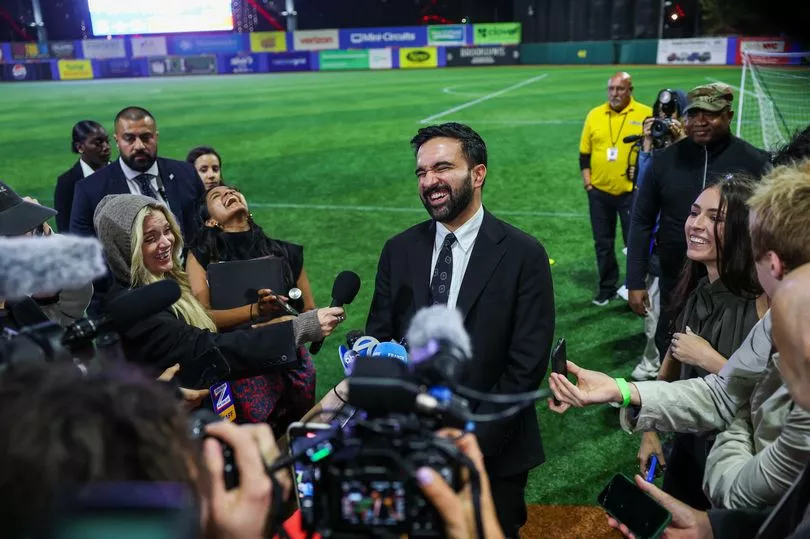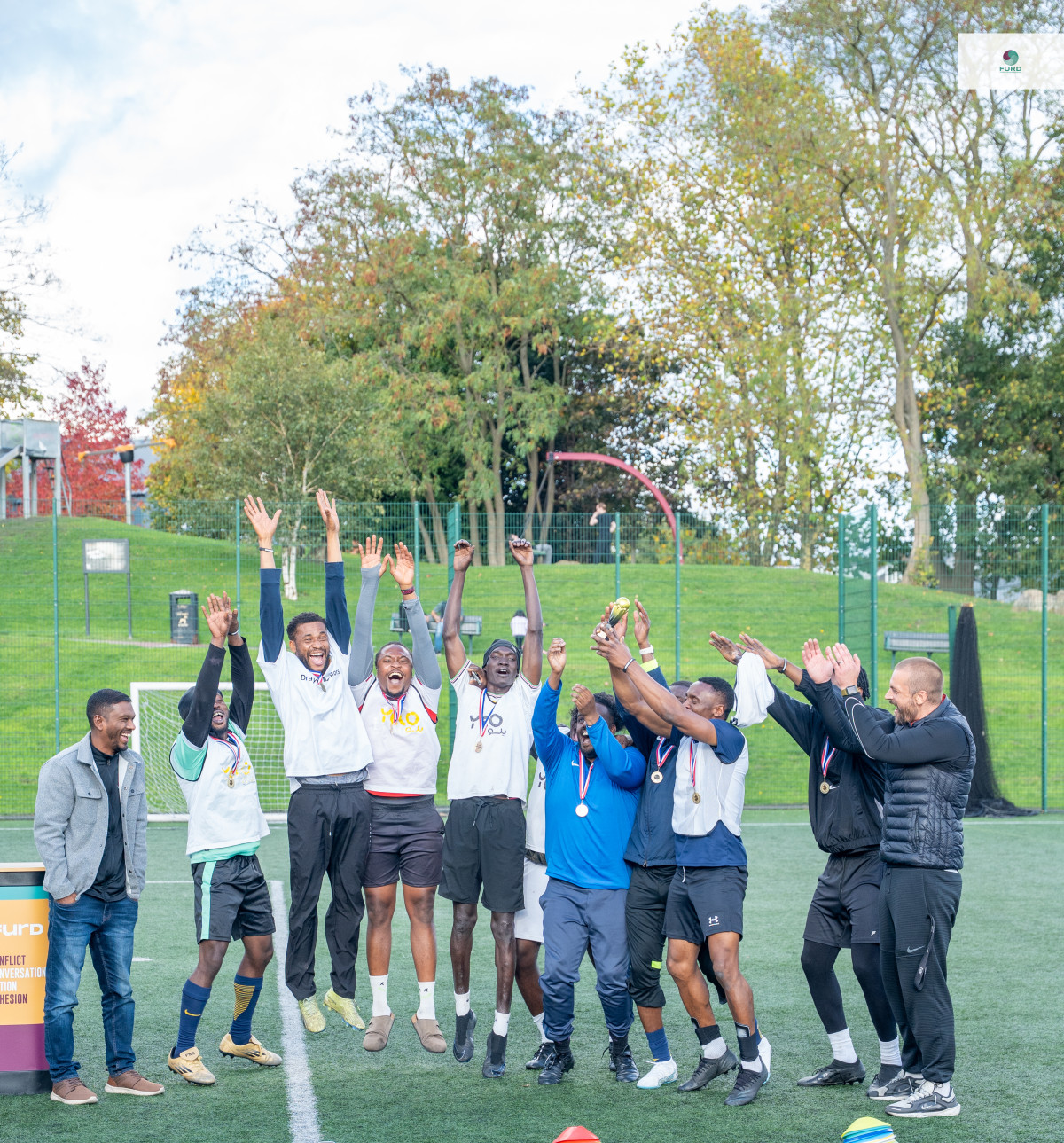Bassam used to be a striker for Izra, an amateur team in Daraa, southern Syria. He is 31, but his slight stoop and the lines around his eyes give him the look of a much older man. In early April, rebels seized a government air base on the outskirts of Daraa, the army counterattacked and the area has been the scene of fierce fighting ever since.
"We couldn't take it in Syria anymore because our lives were threatened on a daily basis," Bassam said. "We, the Syrian people, are living under a very oppressive regime and asking for freedom. There was no differentiation for elderly people, children and women. They were targeting everybody. They were bombing homes, villages … it just became unliveable. So we fled to Jordan, fled the persecution."
Bassam came to Zaatari, a camp in Jordan eight miles from the border. It houses 120,000 refugees, with an average of 400 new arrivals every day. Already Zaatari, officially referred to only ever as a "semi-permanent" settlement, is the fourth-largest city in Jordan and the second-largest refugee camp in the world. Bassam is part of one of a number of projects trying to use football to help those in the camp. "I'm learning how to transform the situation for Syrian children from the trauma they've experienced, creating fun activities for them through football," he said.
"So we have rehabilitation for the Syrian refugees through sport and particularly football. The children arrive completely devastated. Many of them have seen family members killed before their eyes. The journey to Jordan is a difficult one. So what we're trying to do is through football to remove the sense of fear and give them some sense of normalcy. Football is the most popular sport; it plays the role of the mother. It's the only outlet that children have. It's a very difficult life here in the refugee camp and football alleviates their suffering."
The scale of the camp, row on row of flat white huts shimmering in the desert over an area 3.5km long by 2km wide, is hard to comprehend. Syrians are renowned in the Middle East for their skills as merchants and Zaatari, with at least 685 shops, already feels like a monument to that spirit. Walk down the main north-south avenue – the Champs Elysées as it's known – and, but for the uniformity of the buildings, you could be in pretty much any Middle Eastern city. There are greengrocers and butchers, mobile phone stores and shops selling wedding-dresses and caged birds. There is a pool hall, an arcade where kids play online games, cafes and a shawarma restaurant that is said to bring in $15,000 a month.
The appetite for trade has given the place such energy that UN staff say Zaatari has developed more in six months than most camps would in 20 years. Shopkeepers used to selling to at most a couple of hundred families in rural Syria are revelling in the increased market; many have seen the move into Jordan radically increase their income. The camp's turnover is estimated at £8-9m a month, while there are plans to introduce metered electricity – thanks largely to the efficiency of the refugees in running lines off the cables that supply the camp's street lighting into their tents and huts.
The resilience is admirable and passing through Zaatari the most striking thing is how normal it all feels. Bassam, though, speaks of "a bit of tension" among the Syrians, while there is understandable friction between the refugees and Jordanians. Jordan, in recent decades, has become a safe haven, a natural destination for those displaced by conflict elsewhere. Large numbers of Palestinians moved there in 1948, the social impact of which is still being felt, and there are also thousands of Iraqis who fled the war.
It's immediately noticeable how much more common it is in Zaatari to see women wearing hijab, and often a niqab, than it is in Amman. Many of those who have fled Syria are from backgrounds far more conservative than liberal Jordan, and one of the more intriguing projects at Zaatari is how women who have no previous experience of football are being introduced to the game.
Abeer Rantisi, short, bespectacled and fizzing with energy, is a midfielder for the Jordan women's national team who this year became the first Arab nation to qualify for the Asian Championship. When she is not training, she works at Zaatari as a coach. "In football programmes, in sport programmes, the main thing we can work on is self-confidence," she said. "We can bring those people and tell them that they can achieve what they want. For the children we have to make them resilient. They were suffering in Syria and now they are over here so we have to bring them back to life."
The strides made in women's football in Jordan have much to do with Prince Ali Bin al-Hussein, the brother of the king, president of the Jordanian FA and a Fifa vice-president. He has sponsored 15 centres in Jordan to encourage the women's game and was instrumental in persuading Fifa to allow women to wear hijab during matches, something that opened the game up to communities where it would otherwise have been impossible. "He has made a lot of difference in how people think," Rantisi said.
Introducing the game to Syrian women, though, is a challenge. "They have no idea about sport at all," Rantisi said. "At the first lecture we come in, say: 'Hi, we are national team players. We come here just to talk about sport.' 'Ha! What's sport?' They haven't seen it on TV; they're not fit physically."
There are also logistical problems. "It's a really difficult job because they all came from conservative communities and they are not allowed to play in public, so we have to make sure they are hiding all the time," Rantisi said. "It's really a big problem: you can see the camp is open from all sides. We have to find a safe place for them to play and private places for the girls to come to the projects."
That detail speaks to a fundamental truth. It's easy, when you've visited dozens of football aid projects, to become cynical and wonder quite how new balls or pretty bibs are supposed to stop domestic violence or alleviate poverty or prevent the spread of disease, but at the most basic level, football does seem to have a tremendous capacity to enable people to connect with each other, even those with no prior experience of the sport.
To use a metaphor that seems appropriate to the mercantile spirit of Zaatari, it provides a currency in which the exchanges of social interaction can be conducted. Whether any greater benefit ensues is down to the individuals involved but at the very least it offers a forum for communication. As Rantisi said: "We all speak football."
From The Guardian





